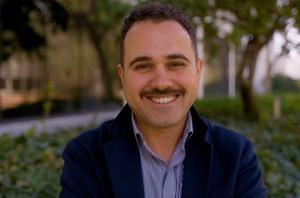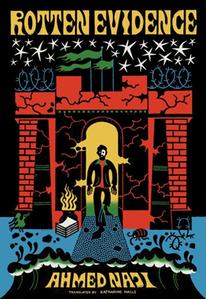 Ahmed Naji is a writer, journalist, documentary filmmaker, and criminal. His novel Using Life made him the only writer in Egyptian history to have been sent to prison for offending public morality. He is also the author of the novels Tigers, Uninvited, and Happy Endings. Naji has won several prizes, including a Dubai Press Club Award, a PEN/Barbey Freedom to Write Award, and an Open Eye Award. He is a fellow at the Beverly Rogers, Carol C. Harter Black Mountain Institute. He lives in exile in Las Vegas, Nev., where his writing continues to delight and provoke. Rotten Evidence: Reading and Writing in an Egyptian Prison (McSweeney's, $20) is Naji's account of serving 10 months in a group cellblock in Cairo's Tora Prison.
Ahmed Naji is a writer, journalist, documentary filmmaker, and criminal. His novel Using Life made him the only writer in Egyptian history to have been sent to prison for offending public morality. He is also the author of the novels Tigers, Uninvited, and Happy Endings. Naji has won several prizes, including a Dubai Press Club Award, a PEN/Barbey Freedom to Write Award, and an Open Eye Award. He is a fellow at the Beverly Rogers, Carol C. Harter Black Mountain Institute. He lives in exile in Las Vegas, Nev., where his writing continues to delight and provoke. Rotten Evidence: Reading and Writing in an Egyptian Prison (McSweeney's, $20) is Naji's account of serving 10 months in a group cellblock in Cairo's Tora Prison.
Handsell readers your book in 25 words or less:
How does one make sense of a senseless oppression: finding oneself in prison for the act of writing fiction?
On your nightstand now:
Searchlight: The Camp that Didn't Fail by Harry Reid
Philosophy in the Bedroom by Marquis de Sade
The Politics of Friendship by Jacques Derrida
Ibrahim Naji: A Late Visit by Samia Mehrez.
The last one has not yet been translated into English. In this book, Mehrez, who is a literature professor at the AUC [American University in Cairo], discovers a forgotten box that contains her grandfather's diaries. She remembers her grandfather through engaging with the famous Arabic poet Ibrahim Naji, who was the face of the Arabic romantic art movement.
Favorite book when you were a child:
One Thousand and One Nights. I discovered an uncensored copy of it at the age of 13 in my grandfather's library. I devoured it in the summer before going to high school. The book played a vital part in my transformation from cocoon to butterfly.
Your top five authors:
Julio Florencio Cortázar, Joyce Mansour, Badar El-Deeb, Susan Lee Sontag, Al-Jahiz.
Book you've faked reading:
The Bible. I believe I am not the only one who has faked reading it.
 Book you're an evangelist for:
Book you're an evangelist for:
Currently, all David Graeber books, especially his last one, published with David Wengrow, The Dawn of Everything: A New History of Humanity. Discovering his works four years ago was a turning point. Reading Graeber makes the world look different. His historical research changed the way I understand our current moment, and led to a profound shift in my perspective.
Book You've bought for the cover:
The Many Deaths of Laila Starr by Filipe Andrade and Ram V. It's a graphic novel, the cover haunted me when I first saw it. It turned out to be the perfect introduction to Indian comics and graphic novels.
Book you hid from your parents:
When my Mom was alive, I tried to hide my books from her.
Book that changed your life:
It's very hard to pick one! So I will be cheeky and highlight two. First, Hopscotch (the original Spanish title is Rayuela) by Julio Cortázar. I was a young poet when I read it for the first time. It was the book that made me want to write novels, and after reading it, I decided to become novelist. Anti-Oedipus: Capitalism and Schizophrenia by Gilles Deleuze and Félix Guattari. Reading and discovering this in 2013 saved me from depression and losing interest in life, it formatted my mind again.
Favorite line from a book:
"I only know two things: first, the world has been taken over by a bunch of bastards and murderers, and second, we shouldn't take it seriously because that's what they want." --La Violence et la Dérision by Albert Cossery (the English translation is titled The Jokers)
Five books you'll never part with:
Sargon Boulus, complete works of poetry
I, Etcetera by Susan Sontag
A marvelous and brave memoir by the Egyptian poet Fatma Kandil, which is not translated into English but should be. I read it two years ago, but scenes and lines from it still pop into my head.
The Threshold: Poems by Iman Mersal
The Origins of Totalitarianism by Hannah Arendt
Book you most want to read again for the first time:
The Book of Disquiet by Fernando Pessoa. I was lucky to discover this book at a young age; I think I was 18 years old. The book and Pessoa's writing in general helped me several times in my life. When I first read it, it became one of my meditation books. I developed this theory of book meditation after reading this book for the first time. It's a book that you can read from any page, and forget yourself while reading, so it helps me if I am sad or in grief or even depressed.

